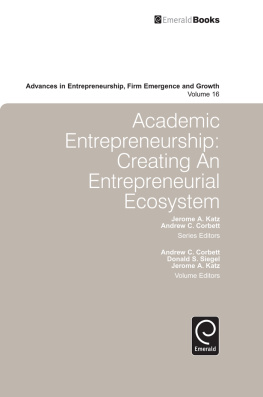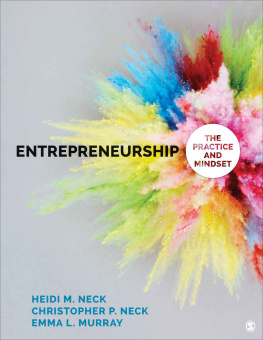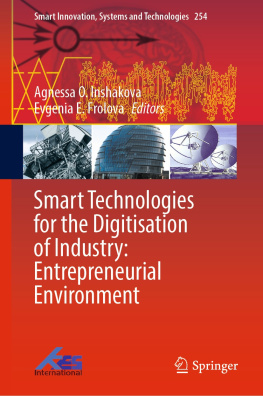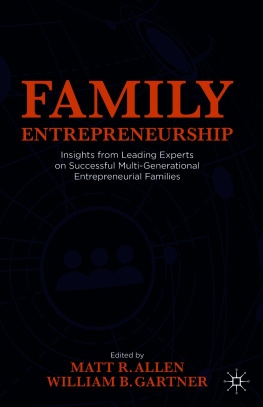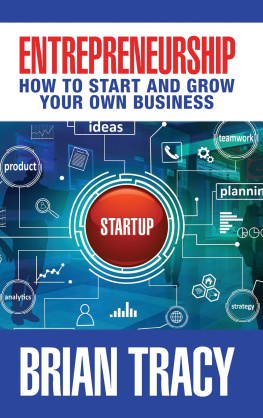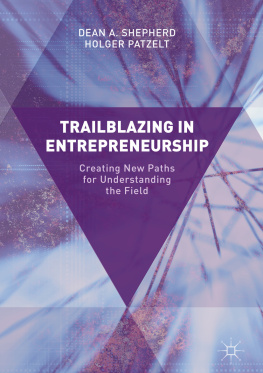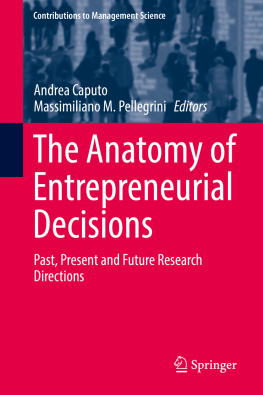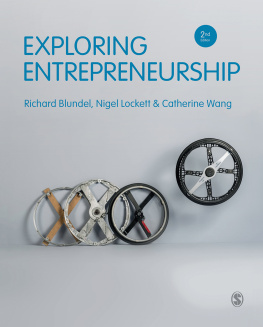ACADEMIC ENTREPRENEURSHIP: CREATING AN ENTREPRENEURIAL ECOSYSTEM
ADVANCES IN ENTREPRENEURSHIP, FIRM EMERGENCE AND GROWTH
Series Editors: Jerome A. Katz and Andrew C. Corbett
Recent Volumes:
Volumes 34: | Edited by Jerome A. Katz |
Volume 5: | Edited by Jerome A. Katz and Theresa M. Welbourne |
Volumes 68: | Edited by Jerome A. Katz and Dean A. Shepherd |
Volume 9: | Edited by Johan Wiklund, Dimo Dimov, Jerome A. Katz and Dean A. Shepherd |
Volumes 1011: | Edited by Jerome A. Katz and G. Thomas Lumpkin |
Volume 12: | Edited by Alex Stewart, G. Thomas Lumpkin and Jerome A. Katz |
Volume 13: | Edited by G. Thomas Lumpkin and Jerome A. Katz |
Volume 14: | Edited by Andrew C. Corbett and Jerome A. Katz |
Volume 15: | Edited by Andrew C. Corbett and Jerome A. Katz |
ADVANCES IN ENTREPRENEURSHIP, FIRM EMERGENCE AND GROWTH VOLUME 16
ACADEMIC ENTREPRENEURSHIP: CREATING AN ENTREPRENEURIAL ECOSYSTEM
EDITED BY
ANDREW C. CORBETT
Babson College, Babson Park, MA, USA
DONALD S. SIEGEL
University at Albany, New York, NY, USA
JEROME A. KATZ
Cook School of Business, Saint Louis University, Saint Louis, MO, USA

United Kingdom North America Japan India Malaysia China
Emerald Group Publishing Limited
Howard House, Wagon Lane, Bingley BD16 1WA, UK
First edition 2014
Copyright 2014 Emerald Group Publishing Limited
Reprints and permission service
Contact: permissions@emeraldinsight.com
No part of this book may be reproduced, stored in a retrieval system, transmitted in any form or by any means electronic, mechanical, photocopying, recording or otherwise without either the prior written permission of the publisher or a licence permitting restricted copying issued in the UK by The Copyright Licensing Agency and in the USA by The Copyright Clearance Center. Any opinions expressed in the chapters are those of the authors. Whilst Emerald makes every effort to ensure the quality and accuracy of its content, Emerald makes no representation implied or otherwise, as to the chapters suitability and application and disclaims any warranties, express or implied, to their use.
British Library Cataloguing in Publication Data
A catalogue record for this book is available from the British Library
ISBN: 978-1-78350-984-3
ISSN: 1074-7540 (Series)


CONTENTS
Mary L. Walshok and Josh D. Shapiro
Sharon A. Simmons and Jeffrey S. Hornsby
Deborah Shepherd and Christine Woods
Bruce Kingma
Paul Miesing, Mingfeng Tang and Mingfang Li
Karin Hellerstedt, Karl Wennberg and Lars Frederiksen
Jonas Gabrielsson, Diamanto Politis and sa Lindholm Dahlstrand
Clare Gately and James Cunningham
LIST OF CONTRIBUTORS
James Cunningham | J.E. Cairnes School of Business & Economics and the Whitaker Institute, National University of Ireland Galway, Galway, Ireland |
Lars Frederiksen | Innovation Management Group, Department of Business Administration, Aarhus University, Aarhus, Denmark |
Jonas Gabrielsson | Lund University, Lund, Sweden; and Halmstad University, Halmstad, Sweden |
Clare Gately | Department of Management and Organisation, Waterford Institute of Technology, Waterford, Ireland |
Karin Hellerstedt | Jnkping International Business School, Jnkping, Sweden |
Jeffrey S. Hornsby | Henry W. Bloch School of Management, University of Missouri-Kansas City, Kansas City, MO, USA |
Bruce Kingma | Whitman School of Management, Syracuse University, Syracuse, NY, USA |
Mingfang Li | Jilin University, Changchun, Jilin, China; and California State University, Northridge, CA, USA |
sa Lindholm Dahlstrand | Lund University, Lund, Sweden |
Paul Miesing | University at Albany-SUNY, Albany, NY, USA |
Diamanto Politis | Sten K. Johnson Centre for Entrepreneurship (SKJCE), Lund University, Lund, Sweden |
Josh D. Shapiro | University of California San Diego Extension, La Jolla, CA, USA |
Deborah Shepherd | University of Auckland Business School, Auckland, New Zealand |
Sharon A. Simmons | Cotsakos College of Business, William Paterson University, Wayne, NJ, USA |
Mingfeng Tang | Southwestern University of Finance and Economics, Chengdu, Sichuan, China; and University of Strasbourg, France |
Mary L. Walshok | University of California San Diego Extension, La Jolla, CA, USA |
Karl Wennberg | Stockholm School of Economics, Stockholm, Sweden |
Christine Woods | University of Auckland Business School, Auckland, New Zealand |
INTRODUCTION
There have always been academic entrepreneurs. The creation of the first universities depended on the patronage of powerful and wealthy individuals, and these were courted by academics seeking to create these institutions of higher learning (). At all points in history, patronage depended in part on a quid pro quo in which academics created works of value to the larger society in the arts, sciences, philosophies, and later in the social sciences.
A uniquely American approach to academic entrepreneurship came with the invention of the agricultural college in the 19th century, where through the Hatch Act the government created a national initiative to promote technology development and transfer in scientific agricultural methods from land-grant universities to their communities and the nation as a whole (). This policy efforts success depended on academic entrepreneurs who operationalized the nascent policies and actually delivered the inventions and service delivery platforms to take academic ideas and put them into practice. The success of this practice led to the U.S. government growing its support of research and commercialization in academia, although it could be generally argued that research far outpaced commercialization in legislation and practice.
That is, until 1980, when the U.S. Congress enacted the BayhDole Act, landmark legislation that dramatically changed intellectual property rights related to the commercialization of university-based inventions. BayhDole instituted a uniform patent policy across federal agencies, removed many restrictions on licensing, and allowed universities to own patents arising from federal research grants. The senators who designed this legislation asserted that university ownership and management of intellectual property would stimulate the commercialization of new technologies and promote economic development and the overall competitiveness of the American economy.

